 5 citations,
September 2018 in “Acta histochemica”
5 citations,
September 2018 in “Acta histochemica” The mTOR pathway proteins are altered in the hair follicles of patients with Lichen Planopilaris and Frontal Fibrosing Alopecia.
 4 citations,
January 2015 in “International Journal of Trichology”
4 citations,
January 2015 in “International Journal of Trichology” Transplanted hair follicles can change and adapt to new areas of the body, with the immune system possibly playing a role in this adjustment.
[object Object]  4 citations,
January 2010 in “Acta dermato-venereologica”
4 citations,
January 2010 in “Acta dermato-venereologica” Low androgen levels can still cause female pattern hair loss.
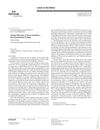 2 citations,
July 2017 in “Skin appendage disorders”
2 citations,
July 2017 in “Skin appendage disorders” Alfredo Rebora suggests a simpler classification for hair loss and a new test for easier diagnosis.
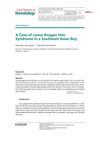 1 citations,
July 2019 in “Case reports in dermatology”
1 citations,
July 2019 in “Case reports in dermatology” A Thai boy was diagnosed with a rare hair disorder causing hair thinning and shedding.
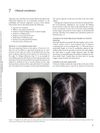 1 citations,
April 2012 in “Informa Healthcare eBooks”
1 citations,
April 2012 in “Informa Healthcare eBooks” The conclusion is that detailed clinical descriptions help pathologists diagnose hair loss conditions more accurately.
 1 citations,
June 1938 in “New England journal of medicine/The New England journal of medicine”
1 citations,
June 1938 in “New England journal of medicine/The New England journal of medicine” Hair analysis can offer clues about a person, but individual differences limit making precise identifications.
 December 2024 in “Journal of Population Therapeutics and Clinical Pharmacology”
December 2024 in “Journal of Population Therapeutics and Clinical Pharmacology” Rosemary and kalonji seeds can improve hair health and treat hair conditions.
 November 2024 in “Research Square (Research Square)”
November 2024 in “Research Square (Research Square)” Lipids may help treat hair loss by promoting hair growth through the HIF-1 pathway.
 March 2024 in “Journal of pharmacopuncture”
March 2024 in “Journal of pharmacopuncture” Hominis Placenta Pharmacopunture helped regrow hair in a patient with stress-induced hair loss.
 September 2023 in “Çukurova medical journal (Online)/Çukurova medical journal”
September 2023 in “Çukurova medical journal (Online)/Çukurova medical journal” EZH2 levels decrease as fetuses develop and are higher in adult skin, which may affect skin growth and repair.

Garlic can help hair grow by activating certain growth pathways, and it works whether you eat it or apply it to your scalp.
 January 2023 in “Open Life Sciences”
January 2023 in “Open Life Sciences” VEGFR-2 activation is likely involved in hair follicle growth, survival, and development.

OCT can effectively screen and diagnose various medical conditions non-invasively.
 November 2017 in “Pediatrics in Review”
November 2017 in “Pediatrics in Review” A 4-year-old girl with hair loss was diagnosed with early-onset trichotillomania and improved with behavioral interventions.
 January 2015 in “Springer eBooks”
January 2015 in “Springer eBooks” Hair health is influenced by genetics, aging, and environmental factors, with proper care needed to maintain it.
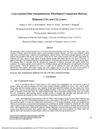 June 1999 in “Proceedings of SPIE”
June 1999 in “Proceedings of SPIE” The CO₂ laser is better for hair transplantation because it causes less damage than the Ho:YAG laser.
 January 1997 in “Elsevier eBooks”
January 1997 in “Elsevier eBooks” The document explains how shampoos clean, rinses condition, one-step shampoos offer convenience, and hair growth promoters aim to prevent hair loss, emphasizing the importance of scientific evidence for their effectiveness.
[object Object]  April 2019 in “Journal of emerging technologies and innovative research”
April 2019 in “Journal of emerging technologies and innovative research” Early treatment of Female Pattern Hair Loss is important to stop it from getting worse, and various treatments can help, especially in mild to moderate cases.
 134 citations,
September 2008 in “Lasers in surgery and medicine”
134 citations,
September 2008 in “Lasers in surgery and medicine” Low fluence photoepilation temporarily removes hair by targeting the hair follicle's pigmented area without severe damage.
 98 citations,
June 2001 in “Journal of biological chemistry/The Journal of biological chemistry”
98 citations,
June 2001 in “Journal of biological chemistry/The Journal of biological chemistry” A cluster of sulfur-rich hair protein genes was found on chromosome 17.
 86 citations,
February 2003 in “Journal of The American Academy of Dermatology”
86 citations,
February 2003 in “Journal of The American Academy of Dermatology” New methods improve how we test hair growth treatments, but challenges like slow hair changes and high costs remain.
 55 citations,
November 2018 in “American journal of human genetics”
55 citations,
November 2018 in “American journal of human genetics” Mutations in the LSS gene cause a rare type of hereditary hair loss.
 45 citations,
December 2014 in “Journal of the European Academy of Dermatology and Venereology”
45 citations,
December 2014 in “Journal of the European Academy of Dermatology and Venereology” Plasmacytoid dendritic cells are a key factor in causing hair loss in alopecia areata and could help differentiate it from other hair loss conditions.
 39 citations,
August 2008 in “Growth hormone & IGF research”
39 citations,
August 2008 in “Growth hormone & IGF research” Raspberry ketone may help grow hair and improve skin elasticity.
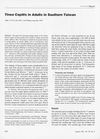 37 citations,
August 1991 in “International Journal of Dermatology”
37 citations,
August 1991 in “International Journal of Dermatology” Most tinea capitis cases in southern Taiwan were in adult women, mainly caused by Trichophyton violaceum.
 30 citations,
November 2013 in “PLOS ONE”
30 citations,
November 2013 in “PLOS ONE” Androgen receptor signaling causes early aging of cells important for hair growth by damaging their DNA.
 25 citations,
September 2018 in “Scientific Reports”
25 citations,
September 2018 in “Scientific Reports” Morroniside may help hair grow and stay in its growth phase by affecting certain cell signals.
 22 citations,
January 2009 in “Medical mycology”
22 citations,
January 2009 in “Medical mycology” A family got a fungal infection from a boy who had contact with rabbits, but they all recovered with treatment.
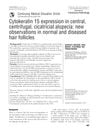 14 citations,
January 2011 in “Journal of Cutaneous Pathology”
14 citations,
January 2011 in “Journal of Cutaneous Pathology” CK15 is not a reliable marker for stem cells in damaged hair follicles from patients with CCCA.





























